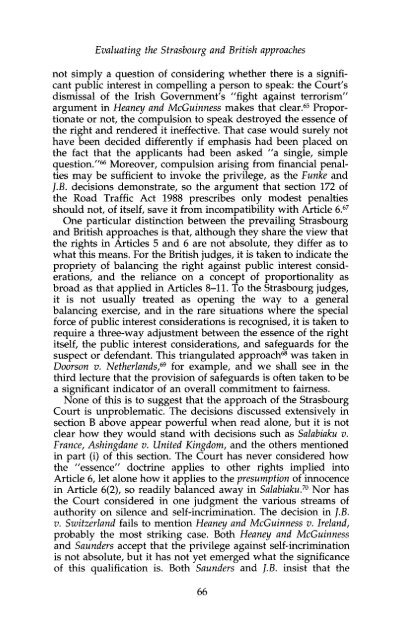Human Rights, Serious Crime and Criminal Procedure - College of ...
Human Rights, Serious Crime and Criminal Procedure - College of ...
Human Rights, Serious Crime and Criminal Procedure - College of ...
- No tags were found...
Create successful ePaper yourself
Turn your PDF publications into a flip-book with our unique Google optimized e-Paper software.
Evaluating the Strasbourg <strong>and</strong> British approachesnot simply a question <strong>of</strong> considering whether there is a significantpublic interest in compelling a person to speak: the Court'sdismissal <strong>of</strong> the Irish Government's "fight against terrorism"argument in Heaney <strong>and</strong> McGuinness makes that clear. 65 Proportionateor not, the compulsion to speak destroyed the essence <strong>of</strong>the right <strong>and</strong> rendered it ineffective. That case would surely nothave been decided differently if emphasis had been placed onthe fact that the applicants had been asked "a single, simplequestion." 66 Moreover, compulsion arising from financial penaltiesmay be sufficient to invoke the privilege, as the Funke <strong>and</strong>J.B. decisions demonstrate, so the argument that section 172 <strong>of</strong>the Road Traffic Act 1988 prescribes only modest penaltiesshould not, <strong>of</strong> itself, save it from incompatibility with Article 6. 67One particular distinction between the prevailing Strasbourg<strong>and</strong> British approaches is that, although they share the view thatthe rights in Articles 5 <strong>and</strong> 6 are not absolute, they differ as towhat this means. For the British judges, it is taken to indicate thepropriety <strong>of</strong> balancing the right against public interest considerations,<strong>and</strong> the reliance on a concept <strong>of</strong> proportionality asbroad as that applied in Articles 8-11. To the Strasbourg judges,it is not usually treated as opening the way to a generalbalancing exercise, <strong>and</strong> in the rare situations where the specialforce <strong>of</strong> public interest considerations is recognised, it is taken torequire a three-way adjustment between the essence <strong>of</strong> the rightitself, the public interest considerations, <strong>and</strong> safeguards for thesuspect or defendant. This triangulated approach 68 was taken inDoorson v. Netherl<strong>and</strong>s, 69 for example, <strong>and</strong> we shall see in thethird lecture that the provision <strong>of</strong> safeguards is <strong>of</strong>ten taken to bea significant indicator <strong>of</strong> an overall commitment to fairness.None <strong>of</strong> this is to suggest that the approach <strong>of</strong> the StrasbourgCourt is unproblematic. The decisions discussed extensively insection B above appear powerful when read alone, but it is notclear how they would st<strong>and</strong> with decisions such as Salabiaku v.France, Ashingdane v. United Kingdom, <strong>and</strong> the others mentionedin part (i) <strong>of</strong> this section. The Court has never considered howthe "essence" doctrine applies to other rights implied intoArticle 6, let alone how it applies to the presumption <strong>of</strong> innocencein Article 6(2), so readily balanced away in Salabiaku. 70 Nor hasthe Court considered in one judgment the various streams <strong>of</strong>authority on silence <strong>and</strong> self-incrimination. The decision in J.B.v. Switzerl<strong>and</strong> fails to mention Heaney <strong>and</strong> McGuinness v. Irel<strong>and</strong>,probably the most striking case. Both Heaney <strong>and</strong> McGuinness<strong>and</strong> Saunders accept that the privilege against self-incriminationis not absolute, but it has not yet emerged what the significance<strong>of</strong> this qualification is. Both Saunders <strong>and</strong> J.B. insist that the66
















